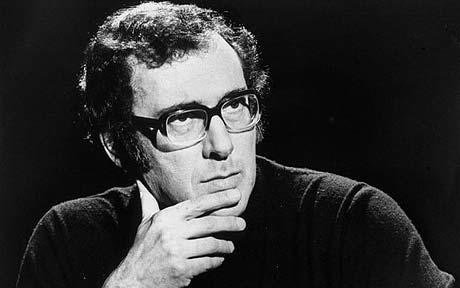IN AN ELEVATOR WITH HAROLD PINTER
Image of Harold Pinter from TheatreGold.
Once, at the BBC Rehearsal Rooms in North Acton, London, I traveled several precious floors in an elevator with the great playwright and screenwriter Harold Pinter—master of the pregnant pause. Nothing was said, although I wanted to say so much. Nothing could be said. Speech would have been banal. The pause, technically, was not a pause at all since there was no dialogue to either side of it. It was simply a silence. A silence within a silence.
Years later, in a Beverly Hills parking structure, I found myself elevator-bound with formidable actor Martin Landau. I wanted to say how excited I was merely to find myself in his presence. Here was a man who had worked with Alfred Hitchcock on one of my perennially favorite films: North by Northwest. Again, I was struck dumb, even if Mr. Landau was not to the pause as Mr. Pinter was—more to the oblique but piercing glance perhaps, of which there were one or two, oblique though not piercing, and not from him…
A couple of years before, I happened to be in Manhattan, in a store on Lexington on the Upper East Side trapped in a packed ‘lift’ (as we English call them) alongside Robin Williams. My fellow elevator travelers could barely contain their excitement at such shoulder-to-shoulder proximity to a celebrity and during our collective anabasis, one of them, in investigative frame of mind, asked the star ‘How is you get recognized so easily?’ To which the ensnared Williams replied, “Must be my face, I guess.” Excruciatingly embarrassed by the awkwardness of it all, I couldn’t wait for the doors to open so I could make my escape…
But why the elevator anecdotes?
In my childhood in working class South London, and later in the verdant Hampshire of my teens, no one knew anyone famous. Actors, writers, directors, musicians, artists—whether famous or not—might have existed on another planet, a heavenly body to which none of us were ever likely to travel. The dictum prevailed that what mattered was not what you might know but whom you already knew.
It’s true, at least in my experience as an educator, that those from family backgrounds of writing, teaching, the arts, the legal world, the stratosphere of sophistication arrive in class with advantages—having grown up with ‘the conversation’, or one not so far removed from it. (On the other hand, there can be considerable pressure for these so privileged to repeat their parents’ level of achievement—which can’t be easy either.)
But not only are other communities, even when marginalized, awash with cultural richness to draw upon, you the individual student—whatever your grounding—are free to learn by engaging with the work over and above with the artist.
My point is that you don’t need to know anyone ‘of note’ or be within the same milieu as anyone. You don’t need to be in the vicinity of anyone in particular. That, alone, is not going to get you anywhere.
What you need is to engage with the material of the filmmakers who excite you. Yes, the path to a career, even to making a movie is long and challenging but there’s little point in embarking on that odyssey if you don’t engage in an understanding of the art you wish to practice…
Listen to and read interviews and Q&As, sure, which can give the impression of proximity to a filmmaker. Feast on the insights and pearls of wisdom they can offer. Know though, that some of the most profound lessons you learn from those you admire are the ones that come through close, forensic exploration of their work, and which you discover for yourself.
Realization is more enlightening than instruction.
Proximity to the working mind of the artist is more revealing than social or physical proximity to their person.
You create that meaningful closeness for yourself. You make their work your fellow elevator traveler, leaving the artist to their privacy. You may then, in some respects perhaps, come to know them better than they know themselves. After all, what artist of note is not, ultimately, a mystery to their own conscious awareness? What they express most potently is not what they know but what they strive to know…
Along with the work of the artist comes your ongoing engagement with the nature of the human soul. This nebulous but all-pervasive entity, present in all (or most, perhaps) of us, is there in all its contradictory aspects for us to endeavor to comprehend—as best we can.
If you want an elevator companion, there’s none more dizzying than this soul. Our needs, behavior, motivations, paradoxes, mischief, mystery, paradoxes, our transgressions, aspirations, flaws and failings, our understanding, our lack of understanding, our strength and our vulnerability, our vision, our myths and stories, our truth—you’ll need the tallest skyscraper for your elevator ascent (hopefully not descent) with this protean character…
Do not remain silent though. Talk, Listen. Probe. Tease. Engage. For they are your interlocutor as, floor by rising floor, you come to wonder at the subject and power of your art…
Peter Markham October 2022
